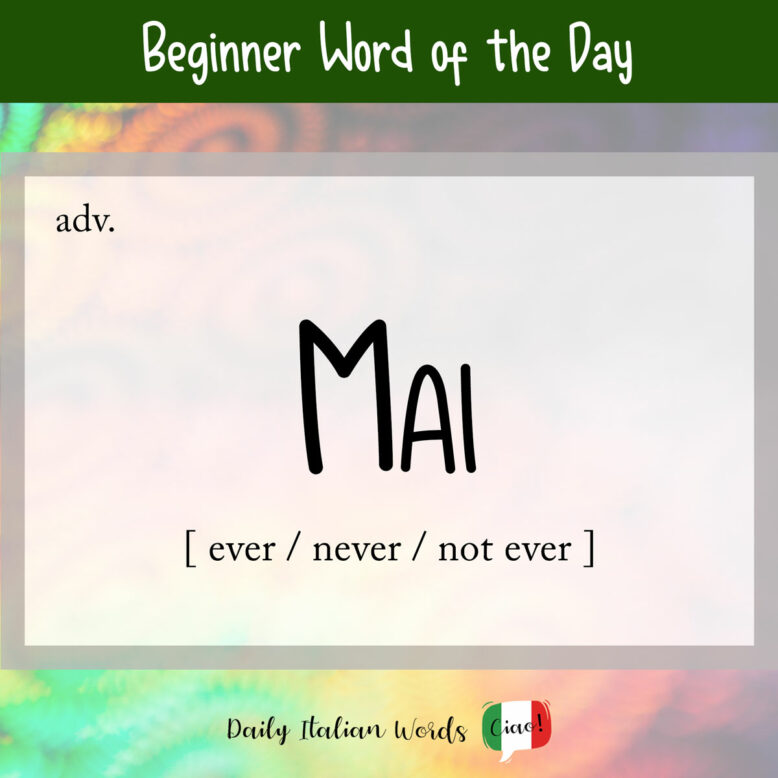Mai is one of those indispensable adverbs in the Italian language that can mean either “ever” or “never / not ever”. Its pronunciation is identical to the English word “my”. It derives from the Latin magis, meaning “more” or “greater”.
mai
ever / never / not ever

When the meaning of mai is negative (i.e. never / not ever), it must appear in the company of the negative adverb non (not), creating a double negative. Unlike English, double negatives are completely acceptable in the Italian language – in fact, even three negative words can appear in the same sentence together!
Non ho mai visto un canguro.
(two negatives – non / mai)
I have never seen a kangaroo.
Non è mai uscita con nessuno.
(three negatives – non / mai / nessuno)
She’s never gone out with anyone.
When the meaning of mai is “ever”, it most frequently appears in interrogative statements.
Sei mai stato in Brasile?
Have you ever been to Brazil?
Nevertheless, there are instances where mai (ever) can also be found in statements, as demonstrated in the example below.
Se mai dovessi avere bisogno del mio aiuto, sai dove trovarmi.
If you ever need my help, you know where to find me.

In simple tenses, such as the present tense, mai generally comes after the conjugated verb.
Non mangio mai carne.
I never eat meat.
In compound tenses, such as the present perfect tense for example, mai is sandwiched between the auxiliary verb (essere or avere) and the past participle.
Non ho mai mangiato il sushi.
I’ve never eaten sushi.
It also comes between verbs and their dependent infinitives.
Non vuole mai tornare a casa.
He never wants to go home.
Additionally, mai serves as the equivalent of ‘ever‘ in words like whoever, whatever, wherever, whenever, why ever, and whichever when used for emphasis in WH questions, often expressing surprise or confusion. Note that in contemporary English, we find this usage somewhat outdated, as we often lean towards using “WH word + on earth” for emphasis.
Perché mai l’hai scelto?
Why ever (or “why on earth”) did you choose it?
It is from this sentence structure that we derive the widely used expression Come mai? which literally translates to “how ever,” but is better understood as “Why/how (on earth)?” or “How come?“
Come mai sei arrivato così tardi?
How come you arrived so late?
Speaking of common Italian expressions featuring mai, let’s take a quick look at the following.
- caso mai = (just) in case → Portati una giacca, caso mai facesse freddo. = Bring a jacket, just in case it’s cold.
- mai e poi mai = never ever → Mai e poi mai tornerò in quel locale. = I’ll never, ever go back to that place.
- mai più = never again → Non lo faccio mai più! = I’ll never do it again!
- ora o mai più = now or never → Devi decidere: se vuoi andare, è ora o mai più. = You have to decide: if you want to go, it’s now or never.
- più…che mai = more…than ever → Matteo è più testardo che mai. = Matteo is more stubborn than ever.

To conclude, let’s take a quick look at the adverb semmai, which is the combination of se (if) and mai (ever). Used as one word, it generally carries the meaning of “if anything” as in the following phrase:
Semmai direi che è il contrario.
If anything, I’d say it’s the opposite.
When written as two separate words, however, its meaning typically shifts to “if ever”, and it must be followed by a verb in the subjunctive mood, given its hypothetical nature. For example:
Se mai dovessi cambiare idea in futuro, fammi sapere!
If you ever change your mind in the future, let me know!
Are you comfortable with using mai after reading this article? We hope so!
Heather Broster is a graduate with honours in linguistics from the University of Western Ontario. She is an aspiring polyglot, proficient in English and Italian, as well as Japanese, Welsh, and French to varying degrees of fluency. Originally from Toronto, Heather has resided in various countries, notably Italy for a period of six years. Her primary focus lies in the fields of language acquisition, education, and bilingual instruction.


